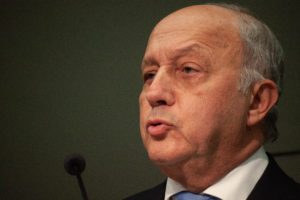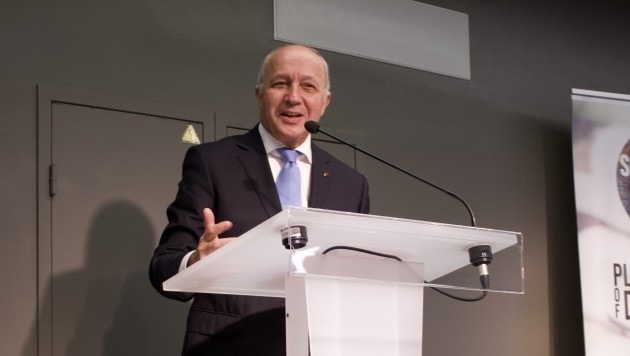Photos by Chloe Joubert and Kenneth Thomas
As part of the SPE association’s Environmental Action Week, former Prime Minister Laurent Fabius arrived on our campus to give a talk on climate change on Wednesday, February 13. The event was organized by the Sciences Géopo association on campus.
As Minister of Foreign Affairs during the COP21, which took place in Paris in 2015, Fabius recounted how he was asked to head the debate and managed to get a consensus from all 196 participants for the Paris Agreement, 183 of which later ratified the agreement. However, as Fabius explained, this was far from enough. With the recent withdrawal of the United States, efforts need to be amped up. According to him, the Paris Agreement was just the beginning, as it saw a convergence between what scientists were saying about climate change (“it’s real, and it’s our doing”), and what Americans, Chinese, and other countries were willing to negotiate. Today, he claimed, we are facing a dramatic situation given that, although the Paris Agreement puts objectives into focus and limits carbon waste, it has no legally binding power. Researchers show that by the end of the century, the planet will increase by 4 degrees celsius, far from the original goal of 2 degrees. This implies that despite the agreements, countries are not doing enough.

Photo: Chloe Joubert
As Fabius explained, it is not Earth’s survival that is questioned, but our own. We are already facing climate change mass migrations. He recounted how, according to the WWF, 60% of wild animals disappeared in a span of 60 years, which can be coined as mass extinction since it is the same number of dinosaurs that disappeared 66 million years ago. The OMS estimates that about 7 million people die each year because of pollution. Glaciers are melting. Whole countries will disappear underwater. As Fabius put it, the situation is “apocalyptic”, and the severity of climate change is usually underplayed in discussions.
Despite this tragic picture, Fabius believes that people need to realize that climate change can also be positive. It can create jobs. In fact, the US government published a study of how the country was losing millions of dollars because of climate change. This could be changed if people realized the economic and technological potential of fighting climate change. Fabius explained that a “social revolt” is one of the best ways to enact changes, as it could destabilize governments and truly force them into taking consideration of the survival of mankind. For him, non-state actors such as cities, regions, or simple individuals need to put pressure on governments. He also explained that continents such as Africa are the least pollutant, but they will be the first to suffer from climate change. If we want them to move away from fossil fuels, we should give them the means to use renewable energies.
Carbon taxes is another method, Fabius explained. Adopted by China and other countries in the North of Europe, the price needs to be fixed so as to deter enterprises from using carbon. Fabius explained how, to him, the example of France and the Gilets Jaunes has shown that this taxation must be implemented following various measures. Firstly, it needs to concern everyone (no one should be allowed to avoid the taxation). Secondly, the government needs to take into consideration that some people might not be able to finance this transition on their own salaries. A thirdly, the tax money shown as used for environmentally friendly purposes.

Photo: Kenneth Thomas
Finally, Fabius explained that the discussion about climate change needs to show the public that it will affect us locally, too. Glaciers are often mentioned, but they are far away, and most people do not really feel concerned. Health and security issues resulting from climate change should be emphasized.
Fabius finished with a slight touch of humor, stating that dinosaurs did not have a moral sense, nor were they credited with an intelligent brain. In our case, it is still left to be proven.
Correction: An earlier version of this article did not mention that the event was hosted by the Sciences Géopo association for the SPE association’s Environmental Action Week. We have edited accordingly.
Other posts that may interest you:
- Much more than a party bureau: an interview with the Association Sportive
- Watch Out for Halloweek Events on Campus!
- Sciences Paws’ Cat Café Event Attracts More Students than Planned
- A Weekend A-WEI
- Dans les coulisses du WEI : interview d’Arthur Roudaut
Discover more from The Sundial Press
Subscribe to get the latest posts sent to your email.





